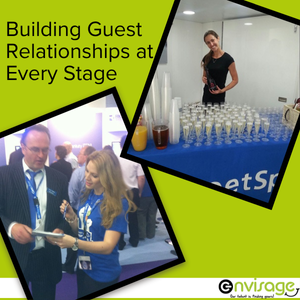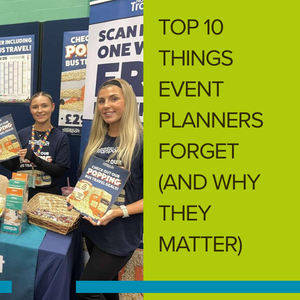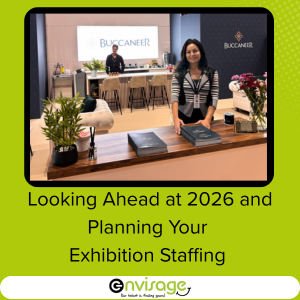Top 10 Things Event Planners Forget (Until It’s Too Late) Planning an event often feels…
How to Build Relationships With Guests Before, During, and After Your Event
Strong guest relationships are the foundation of any successful event. Whether you’re hosting a corporate conference, product launch, or gala dinner, the way you engage attendees before, during, and after the event can make all the difference to its long-term impact.
One often overlooked part of this process is the role of hospitality staff. From welcoming guests to ensuring service runs smoothly, their professionalism shapes the guest experience at every stage.
In this guide, we’ll explore practical ways to build lasting relationships with guests—and how well-trained hospitality staff can make those connections stronger.
Before the Event: Setting the Stage for Connection
Your relationship with guests begins long before they arrive at your venue. The pre-event stage is about creating anticipation, clarity, and comfort, so attendees feel valued from the start.
1. Personalised Invitations and Communications
Sending targeted, personalised invitations creates an immediate connection. Address guests by name, reference their interests, and provide relevant details. Hospitality staff can support this stage by helping with RSVP management, ensuring dietary needs, access requirements, or special requests are recorded and ready to be accommodated.
2. Sharing Helpful Pre-Event Information
Providing clear information in advance helps guests feel prepared. Share event schedules, speaker bios, dress codes, and venue details. Hospitality staff can help by preparing guest packs or welcome materials, ensuring everything is accurate and presented professionally.
3. Early Engagement Opportunities
Encourage guests to connect before the event through online platforms or social media hashtags. This allows them to arrive already feeling part of a community. Hospitality staff can contribute by preparing spaces for early arrivals or pre-event networking receptions.
During the Event: Creating Memorable Guest Experiences with Hospitality Staff
The event itself is the prime opportunity to turn attendees into long-term supporters or clients. This is where hospitality staff are most visible and impactful.
1. First Impressions Count
From the moment guests arrive, their first interaction sets the tone. Professional hospitality staff greet attendees warmly, assist with coats and seating, and provide clear guidance on where to go. This personal, attentive approach instantly builds trust and sets a positive atmosphere.
2. Smooth Service Enhances Comfort
Whether serving drinks at a reception or managing table service at a gala, skilled hospitality staff work seamlessly in the background to ensure guests’ needs are met without disruption. This allows guests to relax, focus on networking, and engage with the event content.
3. Facilitating Conversations
Not every guest is a natural networker. Hospitality staff can act as subtle connectors—introducing guests to one another, prompting discussion, or guiding them to key areas of the venue. Their interpersonal skills help break down social barriers.
4. Managing Guest Flow
Crowded entrances, long queues at the bar, or confusion over seating can all undermine the guest experience. Experienced hospitality teams keep things moving smoothly, directing guests efficiently and keeping the energy positive.
5. Supporting Accessibility and Special Requests
Professional hospitality staff are trained to discreetly handle accessibility requirements, dietary restrictions, or unexpected needs—ensuring every guest feels cared for and respected.
After the Event: Strengthening the Relationship
The guest experience doesn’t end when the lights go down. Post-event engagement is essential for turning a one-time visitor into a repeat attendee or loyal customer.
1. Prompt Thank-You Messages
Send personalised thank-you emails within 48 hours, including photos, key highlights, and any promised resources. Hospitality staff can help by noting VIP attendees, special interactions, or feedback during the event to personalise follow-up.
2. Sharing Event Content
Post photos, videos, and recaps on your website and social channels. Hospitality staff, who have often interacted closely with guests, can help identify the most engaging moments to share.
3. Gathering Feedback
Collecting feedback shows guests their opinions are valued. Hospitality staff can assist by distributing and collecting surveys during the event or encouraging guests to complete online forms afterwards.
4. Keeping in Touch
Regular, relevant updates—whether newsletters, invitations to future events, or exclusive offers—keep your brand top of mind. Hospitality staff contribute by ensuring accurate guest records and contact details are maintained.
Why Hospitality Staff Are Key to Relationship Building
While event organisers focus on logistics and overall delivery, hospitality staff are the face of your event. They are often the people guests interact with most, and their warmth, efficiency, and professionalism directly shape attendees’ perceptions.
Here’s why they’re so impactful:
- They make guests feel welcome and valued from the moment they arrive.
- They handle issues quietly and efficiently, avoiding disruption.
- They add a personal touch, remembering names, preferences, and details.
- They allow organisers to focus on strategic networking while they manage service and guest care.
Investing in skilled hospitality staff is not just about operational support—it’s about elevating the overall guest experience.
Bringing It All Together
Building strong relationships with guests is a journey that spans before, during, and after the event. Each stage offers opportunities to connect, and hospitality staff play a vital role in making those connections meaningful.
By:
- Setting the tone with personalised pre-event communication,
- Delivering exceptional in-person experiences during the event, and
- Continuing the relationship through thoughtful post-event follow-up, you ensure guests leave not only impressed—but eager to return.
When hospitality staff are well-briefed, personable, and aligned with your event goals, they can transform an event from functional to unforgettable.




